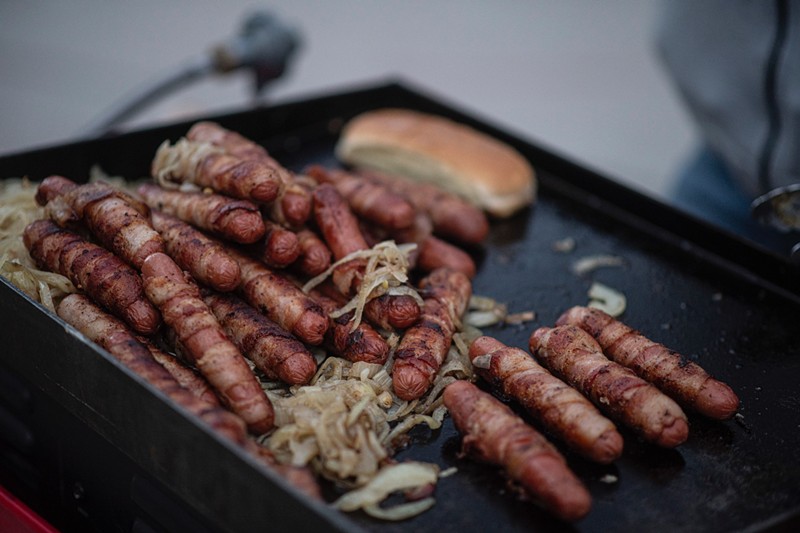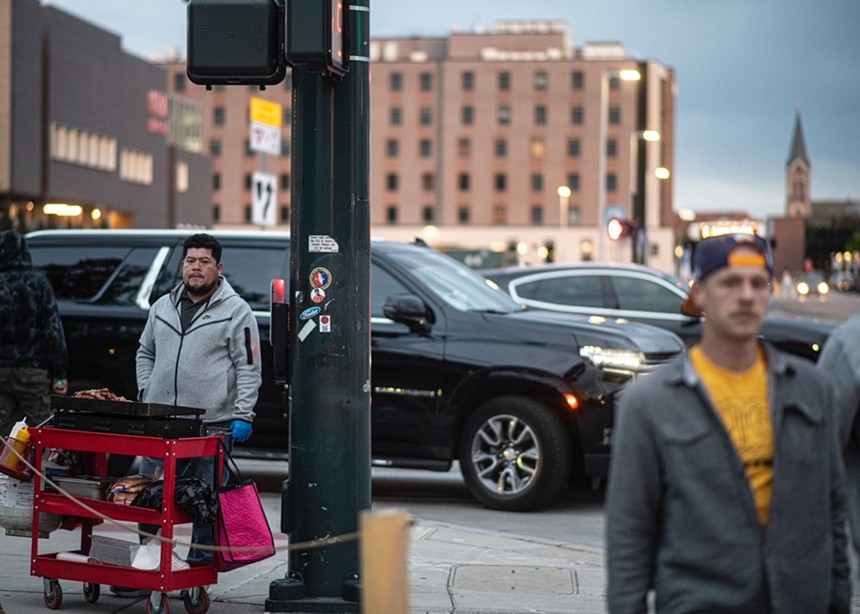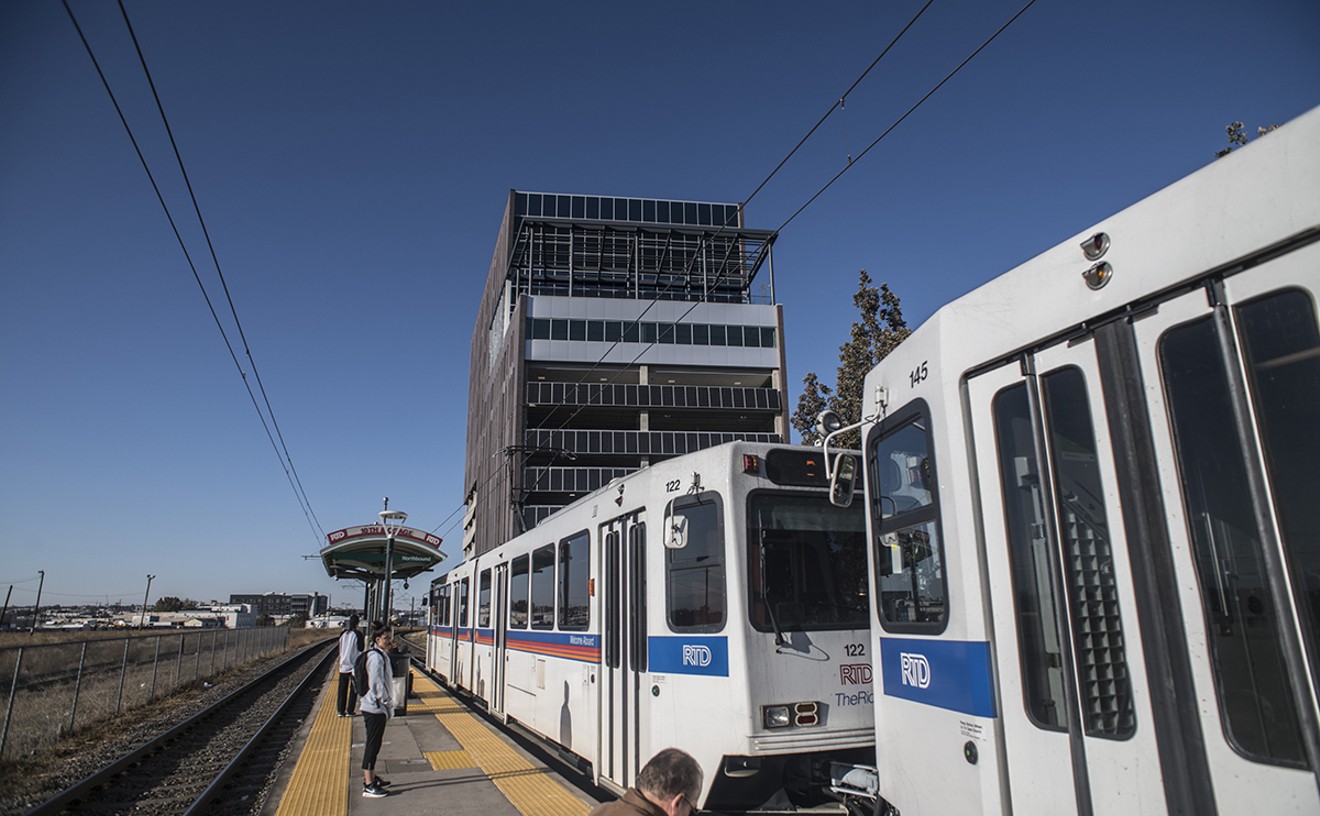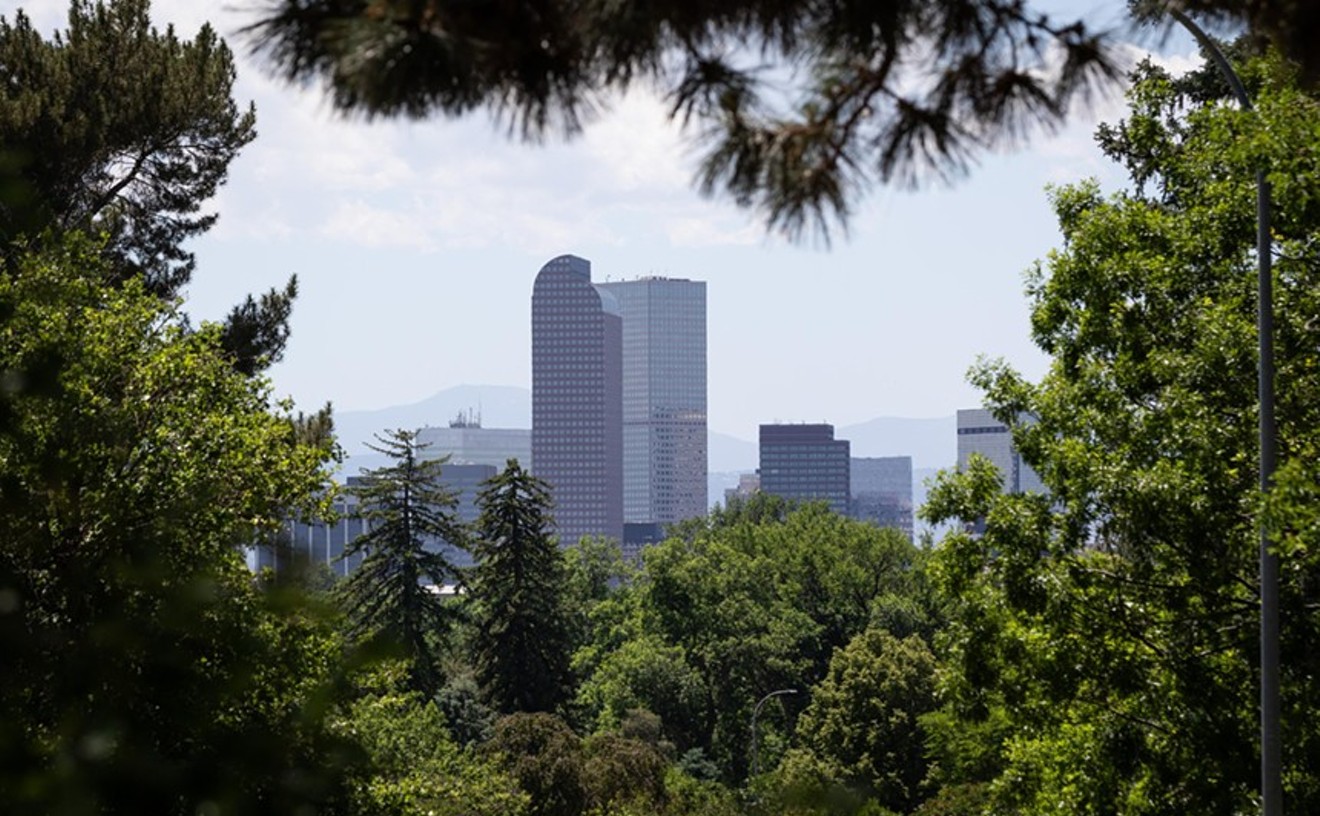Because who’s saying no to a bacon-wrapped glizzy at 2 a.m.?
But city officials, pointing to a surge of unlicensed hot dog vendors in Denver, warn against partaking in street dogs. Without proper health inspections, they say, you could be signing up for more than just a hangover.
“Unfortunately, with the dangerous lack of sanitary standards being practiced by some of the unlicensed hot dog carts, people may find themselves sick the next day and assume it is because of the alcohol they consumed the previous night — instead of the hot dog and bacon sitting unrefrigerated for hours,” says Eric Escudero, spokesperson for the Department of Excise & Licenses.
According to Denver's licensing enforcement team, the most common spots for unlicensed hot dog vendors are outside Ball Arena, near Coors Field and outside the Fillmore Auditorium and other concert venues.
One hot dog vendor was arrested by the Denver Police Department outside of Ball Arena on April 29 after a Denver Nuggets playoff game. However, the incident was atypical, according to the DPD. Alejandro Ramirez, the man arrested that night, allegedly resisted arrest and gave officers a false name.
“Otherwise he would have been cited and released for the license violation,” a DPD statement says. “Certainly, this type of violation is not a high priority for officers, but they can take enforcement action when violations are observed.”
Police usually try to inform unlicensed vendors about the city's permit requirements without bringing them in. The Denver Department of Public Health & the Environment has also been trying to educate unlicensed vendors about local food safety requirements.
“The biggest concern regarding food-borne illnesses from any vendor are those associated with bad hygienic practices: no hand-washing sink, lack of hand-washing, dirty hands touching food, using the bathroom without hand-washing then handling food, no hand-washing between handling money and then handling food," explains DDPHE spokesperson Amber Campbell.
Unhealthy as they are, however, hot dogs are also kind of built for this, Campbell adds.
“Generally, cured foods like hot dogs and bacon aren’t super-risky products unless they are not handled properly and become contaminated,” she says.
The True Cost of Selling Glizzies
To legally sell hot dogs on Denver's streets, people need three types of permits: one from Excise & Licenses, one from the Denver Department of Transportation & Infrastructure (DOTI) and one from the Denver Fire Department.Most hot dog stands need licenses for mobile food carts, which are governed by rules similar to those for food trucks. That license costs a one-time $150 application fee and $25 extra for each service people plan to perform on their carts. Hot dog carts typically spend about $75 to $100 on those items, depending on their exact specifications.
Some hot dog carts fall under peddler’s licenses if they are only selling pre-packaged items that were prepared in licensed, inspected locations. Those licenses cost just $25 for an application fee and $50 for the license.
“The hot dog vendors we see around venues, such as Ball Arena, may fall into both categories,” Campbell says. “The dangers and risks are much greater in situations where active food handling is occurring.”
Like anyone occupying the public right of way, sellers need permits from the Denver Department of Transportation & Infrastructure, too. Right-of-way permits for pushcart vendors — which includes hot dogs, other food and flowers — last an entire year and tie vendors to a specific location for the duration of the year where they can post up any time they want.
To get those permits, people must pay a $25 application fee and send DOTI $336 if they’re approved to reserve their location. The final cost for legal vendors comes in the form of a mobile propane permit from the fire department, which costs $200 annually. In the first year of operation, the DFD requires a safety inspection.
That brings the total cost for legal hot dog hawkers to $811 at the high end.
According to Excise & Licenses, there are 101 food cart operators licensed in the city right now — but according to DOTI, only twelve permitted pushcarts have been approved for right-of-way permits (a thirteenth is pending review). Those twelve aren’t even all necessarily hot dog sellers, as they could be selling flowers, DOTI adds.
Therefore, there are likely fewer than twelve legal hot dog carts operating in Denver right now.
Jim Pittenger — one of the city’s most famous hot dog vendors, who started selling hot dogs on the 16th Street Mall before opening his legendary Biker Jim’s Gourmet Dogs restaurant at 2148 Larimer Street — says the higher cost could be recuperated in a single day in the right location.
“I always felt that if I wasn’t selling 100 dogs a day, I was kind of wasting my time,” he says.
Pittenger started selling franks at 16th and Arapahoe streets in 2005, and then expanded to 17th and California streets and on the Auraria campus before going brick-and-mortar in 2011.
Even vendors who aren’t as legendary as Biker Jim can make their permit costs back in a few days, according to Alex Guzman. He operates a restaurant in Aurora, La Plaza Mexicana Mall, and is licensed through his restaurant as a peddler. Guzman says he can easily make $200 or $300 in just a few hours outside popular spots like Ball Arena or the National Western Center.
“I tell people without a license to get one,” he says. “Last year, I didn’t have a license and got fined.”
Guzman now makes sure he has the right paperwork, but says vendors selling food illegally don’t bother him much because he still gets enough business.
Pittenger, on the other hand, has experienced the competition mobile setups can bring to restaurants even if they are legal. He's seen food trucks take business from brick-and-mortars that are selling the same product during Rockies games.
Back in his street vendor days, Pittenger says he was kicked out of his longtime spot on 16th and Arapahoe when the Christkindle Market moved in nearby during the winter, and the hot dog sellers inside weren’t happy with his looming presence so close by. (Nowadays, the right-of-way permits, updated in 2015, specify that special events take precedence over everyday vendors.)
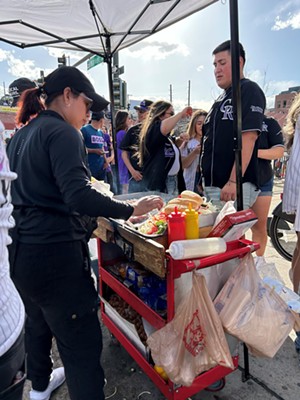
City officials cited this cart outside on Rockies Opening Day downtown for having improper refrigeration practices.
Denver Department of Excise and Licenses
“There were three other vendors that were on the street corner trying to sell hot dogs,” he recalls. “They called the cops on me, and those are probably the people that are calling the cops out on the illegal vendors.”
Pittenger understands, he says. Local restaurants and businesses have raised complaints over how difficult the city’s permitting processes have become as well as other local costs of doing business. Those who take the time to wade through all the requirements shouldn’t have to compete with those who haven’t, he says.
“People need to try and make money in a way they can, but I've never been too appreciative of people hawking in on somebody's business that they've gone through that struggle to make sure that they have the right licensing and the right insurance for the spot,” he argues.
Plus, there’s always the chance of unsafe food practices making people sick.
“We're all in the business not to make our customers sick,” Pittenger says. “That's our mission: feed people, make a buck and hopefully have our customers come back because they're alive and didn't get sick.”
However, Pittenger also acknowledges that plenty of unlicensed food hasn't caused him to end up ill.
"If you've ever bought a burrito in front of Sam's Club out of a cooler, I've done that a lot, and so far, I've survived," he says.
On the bright side, the DDPHE hasn’t received any food-borne illness complaints associated with food vendors outside Ball Arena. Nor has the department had any cases of food-borne illness connected to peddlers or mobile food businesses in the last year.
Hot Dog Safety Steps
Although reported incidents are slim, the DDPHE says it's safer for everyone if sellers follow Denver’s food safety guidelines.The DDPHE requires that most items be prepared in an approved commissary before being assembled on the cart itself. In the case of hot dogs, that preparation includes slicing onions, peppers and other sausage toppers. Most carts are actually supposed to operate from a commissary or restaurant they return to daily, according to the city. Licensed carts also must have a hand-washing sink with soap and paper towels on site.
Key for food safety: Any potentially hazardous foods are required to be kept at proper temperatures through commercial refrigeration or hard-sided coolers. Officials encourage people to check for refrigeration as one way to avoid unlicensed operations.
DOTI doesn’t issue permits on the 16th Street Mall, as that is under the purview of the Downtown Denver Partnership, which has its own vendor registration process. Coors Field has boundaries where people aren’t allowed to set up, and DOTI won’t approve more than one vendor on each corner of an intersection. The department also tries to make sure that brick-and-mortars aren't stepped on, either.
“All Pushcarts, Flower Carts, or other vendors shall not be within two hundred feet of a private establishment offering comparable goods or services located in a fixed premises with a direct entrance on the Sidewalk,” permit information specifies.
If you think you’ve gotten sick from an illicit glizzy, you can report it online or call 311.

